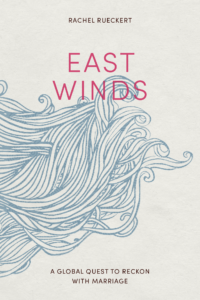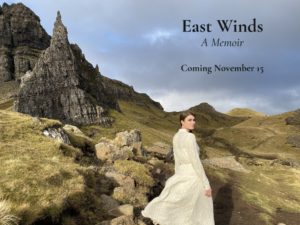“Where did you get the idea to write this book?” someone recently asked me. I’d mentioned my forthcoming memoir East Winds: A Global Quest to Reckon with Marriage, and how I’d gone on a year-long honeymoon—a backpacking around the world—where I studied marriage across South America, Asia, and Europe while also grappling with what marriage, including my own, meant to me.
The question struck me as perfectly reasonable. Yet, hearing it for the first time, it felt absurd. I knew what it was like to feel inspired by an initial idea. That process had guided me in writing poems, essays, short stories, and most recently, a novel. Often, I can point to an original spark, a scene, that moment where it came to me.
 But writing East Winds over the past eight years felt nothing like that. Rather than being struck by the lightning of an idea (to use that familiar metaphor), it felt like lightning was already inside me, crackling from within, white-hot and burning to escape and be seen and studied and witnessed and understood by me, its host.
But writing East Winds over the past eight years felt nothing like that. Rather than being struck by the lightning of an idea (to use that familiar metaphor), it felt like lightning was already inside me, crackling from within, white-hot and burning to escape and be seen and studied and witnessed and understood by me, its host.
“I wrote the book because I had to,” I answered. “I was compelled.” I feel like I’ve been writing this book all of my life, not only the past eight years of active drafting.
Growing up in Davis County, Utah, I’d been taught about marriage at home and at church and in all I saw around me. The lessons did not match what I witnessed between my parents. And as I grew older—being kicked out of my house at the age of my fifteen due to my mother’s undiagnosed delusion disorder, attending BYU–Provo, and then becoming obsessed with travel and escaping expectations—I feared something was deeply wrong with me because I did not want to get married. I was restless and didn’t want what I was “supposed” to want, this essential part of what I understood to be necessary for salvation. And yet, I also longed to belong and have roots, to feel safe and loved. I had no language, no models, for where I fit.
Moving to Massachusetts for graduate school, I struggled in new ways for belonging and understanding. Soon after arriving, I met Austin—an adventurous, incredible man who was easy to fall for. When we got engaged, my panic attacks started. As I wrote in East Winds,
I couldn’t shake the feeling of resistance, couldn’t articulate what, precisely, I was resisting—like trying to describe air. My windy disposition meant I was no stranger to cyclones of cold anxiety mixing with my hot, brazen courage. Yet I could not fully see or identify this particular haze—not the reason for why I was getting married, but why I felt I had to get married. This was always my choice, but one with a perceived right answer in the thick, powerful atmosphere all around me.
When I tried to talk about my concerns and ambivalence with friends, colleagues, and mentors who did not share my cultural upbringing, they said things that made me feel even more alone in my messy experience. “You’re too young” or “You’ve only dated for two years!?” (Later, during the near-decade of writing East Winds, they would say things like “I don’t understand why you got married then,” “Shouldn’t you have figured this out beforehand?” or even “No one wants to read about what a twenty-something has to say about marriage.”)
But I kept writing toward understanding. I had to. East Winds gave me the container to explore this tension with nuance and love while also learning to trust in the day-to-day choice of partnership, and in myself, regardless of the larger cultural pressures around me.
 As Toni Morrison once said, “If there’s a book that you want to read, but it hasn’t been written yet, then you must write it.” This is the book I needed, the book I wish I could go back in time and give to my younger self. I gave this memoir absolutely everything I have, showing up with as much personal truth as I know how to summon. I hope it resonates with others in our community, particularly women who felt dissonance in how we talk about or experience marriage. I hope it makes space for questions and questioners alike.
As Toni Morrison once said, “If there’s a book that you want to read, but it hasn’t been written yet, then you must write it.” This is the book I needed, the book I wish I could go back in time and give to my younger self. I gave this memoir absolutely everything I have, showing up with as much personal truth as I know how to summon. I hope it resonates with others in our community, particularly women who felt dissonance in how we talk about or experience marriage. I hope it makes space for questions and questioners alike.
As I say in the dedication page, this book is for Austin—with my eternal love—but it also for:
The sixteen-year-old who felt concerned about where to attend college, only to be told by her boyfriend, “It doesn’t matter where you go. You’ll only need your degree if your husband dies.”
The girl who received dishes, pans, and towels for holidays (while her brother received stereos and skis), then received a hope chest filled with linens and quilts for her high school graduation.
The twenty-three-year-old who was cornered by a bishop’s wife after church and asked, “Do you feel like an old maid, wishing you were already married?”
The young woman who was encouraged to wear makeup because “the frosted cookies are always the first to go.”
The twenty-something, struggling with eating disorders and depression, who was often told by people at church, “You’re so beautiful. I don’t understand why you aren’t married yet,” to which she’d reply, “It must be my horrible personality.”
The woman who was told that if she wore her Army Class A uniform to church, she would never “attract” a husband because he would feel like he wasn’t the boss in the relationship.
The woman who showed up to her new congregation’s meet and greet and was asked by the same person, multiple times, who her husband was, then had to keep stating that she was unmarried—it was just her.
The twenty-year-old who felt like running on her wedding day when she heard that she was promising to hearken to and obey her husband, but he didn’t have to do the same for her in return.
The thirty-something who gets placed at the kids’ table during family reunions while her nineteen-year-old, married cousins sit with the adults.
The senior who showed her BYU undergrad advisor her grad school acceptance letter from Stanford and was met with: “How lovely. Maybe you’ll marry a nice linguist!”
The woman who stayed in an abusive marriage because leaders told her that once you choose your love, you love your choice—no matter what.
The biomedical PhD specializing in cancer immunology who was constantly told that having a family was a holier pursuit, that her priorities weren’t in order.
The twenty-something whose honored grandparents warned her that if she didn’t stop traveling and exploring so much, no man would be able to catch her. So she reined herself in so she could be caught.
The third-generation missionary who was taught that she could balance career and family, with a wise grandmother stating that she had “better things to do than climb into bed with some damn man.”
For all these Mormon women, and hundreds of others, who shared with me these and other experiences—some similar, some opposite, all different. We are never a monolith. Here, I add my singular truth to the mosaic.
 Rachel Rueckert is a writer, editor, teacher, and a seventh-generation Utahn. East Winds is her first book and has received generous advanced praise, including a Kirkus Starred Review. Please consider supporting by preordering a copy before the November 15 launch from By Common Consent Press.
Rachel Rueckert is a writer, editor, teacher, and a seventh-generation Utahn. East Winds is her first book and has received generous advanced praise, including a Kirkus Starred Review. Please consider supporting by preordering a copy before the November 15 launch from By Common Consent Press.
Rachel holds an MFA from Columbia University, an M.Ed from Boston University, and serves as the editor in chief of Exponent II. To learn more about her and her work, visit rachelrueckert.com or connect on linktr.ee/rachelrueckert.

Thank you again for publishing this! So grateful for this community.
Loved this and ADORE this book.